when do you have class
- 格式:ppt
- 大小:2.98 MB
- 文档页数:14
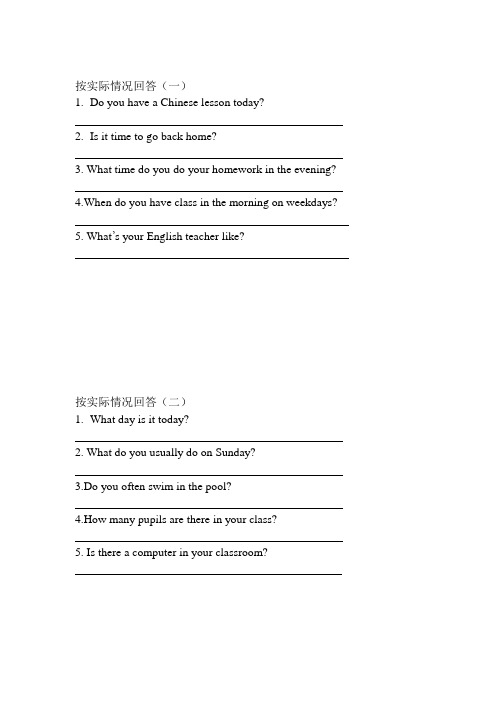
按实际情况回答(一)1.Do you have a Chinese lesson today?2.Is it time to go back home?3. What time do you do your homework in the evening?4.When do you have class in the morning on weekdays?5. What’s your English teacher like?按实际情况回答(二)1.What day is it today?2. What do you usually do on Sunday?3.Do you often swim in the pool?4.How many pupils are there in your class?5. Is there a computer in your classroom?按实际情况回答(三)1.Is Christmas Day on December 25th?2. What time do you usually have breakfast?3.Do you take exercise every day?4.What’s your favourite sport?5.What day is it today?按实际情况回答(四)1.Who’s your English teacher?2. Is your mother in a red dress?3.Can you see your father?4.Do you have a pair of glasses?5.How many people are there in your family?按实际情况回答(五)1.Do you have a kind teacher?2.Is your English a lady or a man?3.Who’s your music teacher?4.What is your maths teacher like?5.Can you see any trees in your classroom?按实际情况回答(六)1.When do you usually get up on school days?2.What time do you have dinner?3.Do you take exercise in the afternoon?4.Is it time to sleep now?5.Where is your science book?按实际情况回答(七)1.What day is it today?2.Is it Saturday today?3.What’s your favourite day?4.Do you have a music lesson on Tuesday?5.How many days are there in a week?按实际情况回答(八)1.What do you do on Saturday?2.What’s your favourite day?3.Do you watch TV in the evening?4.When do you do your homework?5.What day is it today?按实际情况回答(九)1.What day is it today?2.What’s your favourite day?3.Do you like Sunday?4.What do you often do after school?5.What time do you usually get up on school days?按实际情况回答(十)1.What do you do after school on school days?2.Do you go shopping when you have free time?3.What time do you usually have dinner?4.When do you usually go to school?5.Is it Thursday today?按实际情况回答(十一)1.What do you often do when you have free time?2.Do you like skating?3.What are you doing now?4.What’s your favourite sport?5.What do you like doing?按实际情况回答(十二)1.What are you doing now?2.What do you like doing?3.What do you usually do on Sunday?4.What’s your favourite subject?5.Do you like running?按实际情况回答(十三)1.What’s your favourite colour?2.How old are you?3.Do you like sport?4.How old is your father?5.Is your mother forty years old?按实际情况回答(十四)1.Do you like Spring Festival?2.Is your birthday in summer?3.How old are you?4.What do you like doing on Mother’s Day?5.How many presents do you have on your birthday?按实际情况回答(十五)1.Are you a pupil or a teacher?2.Is there a fruit shop near your house?3.Are your shoes black and white?4.How many playgrounds are there in your school?5.Where are your sofas?按实际情况回答(十六)Where are your books now?What’s in your bedroom?How much is your pen?What do you want to be when you grow up?Is your pencil-case new or old?。
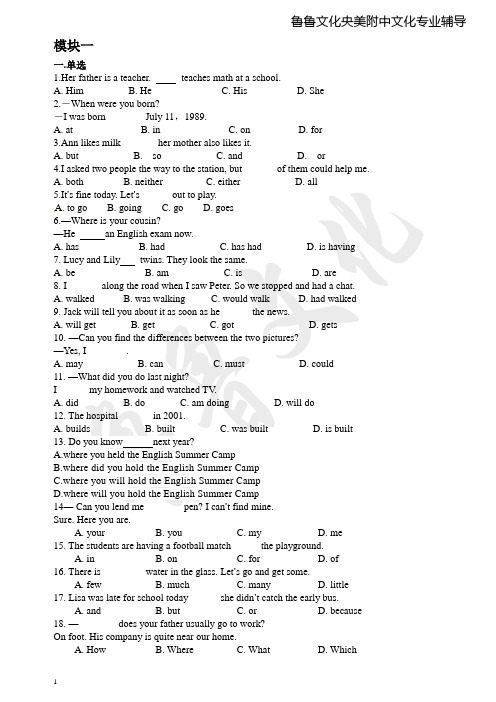
模块一一.单选1.Her father is a teacher. teaches math at a school.A. HimB. HeC. HisD. She2.-When were you born?-I was born________July 11,1989.A. atB. inC. onD. for3.Ann likes milk_______ her mother also likes it.A. butB. soC. andD. or4.I asked two people the way to the station, but ______ of them could help me.A. bothB. neitherC. eitherD. all5.It’s fine today. Let’s______ out to play.A. to goB. goingC. goD. goes6.—Where is your cousin?—He an English exam now.A. hasB. hadC. has hadD. is having7. Lucy and Lily twins. They look the same.A. beB. amC. isD. are8. I ______ along the road when I saw Peter. So we stopped and had a chat.A. walkedB. was walkingC. would walkD. had walked9. Jack will tell you about it as soon as he______ the news.A. will getB. getC. gotD. gets10. —Can you find the differences between the two pictures?—Yes, I________.A. mayB. canC. mustD. could11. —What did you do last night?I ______my homework and watched TV.A. didB. doC. am doingD. will do12. The hospital ______ in 2001.A. buildsB. builtC. was builtD. is built13. Do you know __next year?A.where you held the English Summer CampB.where did you hold the English Summer CampC.where you will hold the English Summer CampD.where will you hold the English Summer Camp14— Can you lend me _______ pen? I can’t find mine.Sure. Here you are.A. yourB. youC. myD. me15. The students are having a football match _____ the playground.A. inB. onC. forD. of16. There is ________ water in the glass. Let’s go and get some.A. fewB. muchC. manyD. little17. Lisa was late for school today______ she didn’t catch the early bus.A. andB. butC. orD. because18. — _______ does your father usually go to work?On foot. His company is quite near our home.A. HowB. WhereC. WhatD. Which19. Sara got ill yesterday. She felt a little _______ this morning.A. illB. worseC. worstD. the worst20. — _______ you make dumplings?No. Let’s have some noodles.A. CanB. MayC. MustD. Should21. Mary _______ the piano well. She is often asked to play at the concert.A. playB. playsC. playingD. played22. — I didn’t see you at the meeting.I had a bad cold. The doctor asked me _______ in bed.A. stayB. stayedC. stayingD. to stay23. Lucy _______ her cat and now she is washing it.A. findsB. is findingC. has foundD. will find24. — I watched a new play last night. What about you?I ______ over maths for today’s test.A. goB. wentC. am goingD. have gone25. It is reported that China’s largest museum of modern art _____at the end of 2015.A. buildsB. is builtC. will buildD. will be built26. — Do you know _______ the iPad last week?Sorry, I have no idea.A. how much did she pay forB. how much will she pay forC. how much she paid forD. how much she will pay for27. — Who’s that tall boy?______ name is Tom and he is from the UK.A. HisB. HerC. YourD. My28. — Where is Jenny?She must be ______ the reading room. She likes reading a lot.A. onB. atC. toD. of29. — ______ does the book cost?$ 19.80. A little bit expensive.A. How farB. How muchC. How soonD. How long30. — I won’t go to the party tonight.______ you told me you would. What’s the matter?A. SoB. OrC. BecauseD. But31. — May I take this magazine out of the library?No, you ______.A. may notB. coul dn’tC. needn’tD. mustn’t32. — How do you like the film, Jane?______ interesting. It’s a waste of time.A. SomethingB. AnythingC. NothingD. Everything33. Mum asked me ______ the room at least once a week.A. cleanB. cleanedC. to cleanD. cleaning34. I think skiing is ______ than climbing. That’s why I like it.A. excitingB. more excitingC. most excitingD. the most exciting35. — Did you mail the cards to your friend?No, I ______ them tomorrow.A. mailB. mailedC. have mailedD. will mail36. Today train tickets can ______ online at any time.A. buyB. boughtC. be boughtD. were bought37. — Hi, Jack. Would you like to go to Hawaii for the summer holiday?I’d love to! Though I ______ there twice.A. amB. wasC. will beD. have been38. If it ______ today, we’ll have to leave on Wednesday instead.A. snowsB. snowedC. will snowD. is snowing39. — Could you tell me ______ to America for further study?Next month.A. when will he flyB. when he will flyC. when did he flyD. when he flew40. My mother is a nurse. She loves _________ job very much.A. myB. herC. hisD. its41. ---When is the World Environment Day every year?---It’s ______ June 5th.A. inB. atC. onD. to42. ---I’ve got a bad cold.---Take this medicine, and you’ll feel much ________.A. goodB. betterC. bestD. the best43. ---Would you like to go to the concert with me?---I’d love to, _____ I’m afraid I have no time.A. butB. soC. andD. or44.--- _______is my dictionary? I can’t find it.--- Oh, it’s in your bedroom.A. WhyB. WhenC. WhatD. Where45. ---_______ you play tennis?--- No. But I can play table tennis.A. CanB. MayC. MustD. Should46. He is a hard man. ____________ can stop him from carrying out his plan.A. SomethingB. AnythingC. EverythingD. Nothing47. ---___________ workers are there in your factory?--- About 1000.A. How longB. How soonC. How oftenD. How many48. --- What does your sister do?--- She is a teacher. She ___________ English at No.5 Mi ddle School.A. teachesB. taughtC. will teachD. has taught49. Let’s stop ____ a rest. We’ll begin again after 10 minutes.A. haveB. havingC. to haveD. has50. ---What do you think of the new film“Life of Pi”?---It’s so fantastic that I ________it twice.A.saw B.have seen C.will see D.see 51. ---Do you know the famous Chinese writer Mo Yan?---Of course. His books_______ by more people all over the world.A. readB. have readC. are readD. were read52.--- Jim, can you tell me ______ every week?--- On Monday afternoon.A. when do you have class meetingsB. when you have class meetingsC. when did you have class meetingsD. when you had class meetings 二.完形填空Roberta appeared on the stage(舞台). She took a deep breath and began to speak. Now she was Portia, a strong-willed 35 in Shakespeare’s The Merchant of Venice(莎士比亚的威尼斯商人). The theater was filled with people. She was speaking with a power she had never before 36 , the words flowing smoothly from her.37 , Roberta had never acted in her life before the audition(选拔试演). She 38 being in front of other people. She was very 39 at school. She had never thought she was good enough at anything to attract much attention. She stayed mostly to herself, making 40 friends. She had excellent grades, 41 she always thought that something was missing.Two weeks before the audition, Roberta’s mother had heard about it and 42 her to join in.“ I can’t think of anyone else better suited to play the part. Remember all the plays you used to act out for us? ”Roberta looked down, “ I am not interested.””’s (((( enjoy ed((((((((模块二三.阅读理解AYesterday I went for a bus ride to the countryside. The bus was not full and I had a good seat at the front.For about an hour we were on the freeway( 高速公路). Then we turned off and drove along a narrow country road.Soon the road began to climb. We left the fields and villages behind us and came to a forest. There was very little sunlight and it was quite dark.When we reached the top of the hill, the driver parked the bus. We all got out. I could see a long way. We were several thousands meters high. It was very cold.I wanted to go for a walk, but the bus driver said there was going to be a storm. He wanted to leave before the storm came.When we were halfway down the hill, I remembered something. On the way up the hill there had been an old lady sitting behind me. She wasn’t sitting there now. I looked around the bus. There wasn’t any old lady on the bus anywhere.I told the driver about her. He had to turn the bus around and go up the hill again. When we reached the top, the old lady was waiting in the rain for the bus. She scolded(责备) the driver for leaving without her. She thanked me for remembering her.65. Where did the driver park the bus?A. At a farm.B. In a storm.C. On top of a hill.D. At an old lady’s house66. Why did the bus go back to the top of the hill?A. Because the road was full of cars.B. Because an old lady forgot her hat.C. Because one person was not on the bus.D. Because the storm came.67. What did the old lady think about the bus driver?A. He was very kind.B. He was careless.C. He was lazy.D. He was hard-working.BKenny Richards wishes everyone knows as much about Tourette’s Syndrome( TS,抽动秽语综合症) as he does. As a youth ambassador( 大使) for the Tourette’s Syndrome Association in the US, the 13-year-old boy wants to help kids and adults learn more about TS.“It’s not contagious(传染的), ”said the eighth-grader at Hudtloff Middle School in Washington State. “ It’s a tic disorder(抽动障碍). It’s common with kids. ”According to Richards, TS is mainly made up of movement tics. At least 100, 000 Americans have this problem. It often appears in childhood but can improve in youth or adulthood.Richards was told he had TS three years ago when his eyes always “ went crazy”. Because of this, he was placed in the special needs classroom, but he said the work wasn’t challenging. His first year of middle school was so stressful that his mom took him out of school and home-schooled him for the year.“ My parents thought that because I had TS that it was harder for me to learn, but it wasn’t,” he said. The next year, he returned to school and his grades improved.Being named a youth ambassador last year also helped Richards’ confidence. This spring, he and his mom traveled to Washington D. C. , for a meeting and training. He met other kids from around the country who were also dealing with TS. “ Each one of us had a bond(纽带) , ” said Richards. “ It also made me realized I don’t have to get so stressed-out over it.”Now, Richards wants to visit a primary school. Since becoming a TS ambassador, he said, he feels more comfortable taking about the disorder.“ I’m open and free at any time, anywhere, ” Richards said.68. Richards studied at home for a year because__________________ .A. the middle school work was too challenging for himB. his parents thought TS had a bad influence on his studiesC. he didn’t want other people to know about his illnessD. he couldn’t get along well with other classmates69. Which of the following about Kenny Richards is True?A. He is a youth ambassador for the United Nations.B. He knew he got TS when he was 10 years old.“ It will”center.模块三五.任务型阅读AA store owner was putting up a sign above his door that read “ Puppies(小狗) For Sale”. Signs like that have a way of attracting small children. A little boy appeared under the store owner’s sign. “How much are you going to sell the puppies for?” he asked.The store owner replied, “ Anywhere from $30 to $50. ”The little boy reached in his pocket and took out some change. “ I have $2.37, ” he said. “ Can I look at them?”The store owner smiled and whistled(吹口哨), five puppies were running down the aisle(过道) of his store. One puppy was lagging(落后) behind. The little boy said “What’s wrong with that little dog? ”The store owner explained that it didn’t have a hip socket(髋部). It would always be lame(瘸的). The little boy became excited. “ That’s the little puppy that I want to buy.”The store owner said, “ No, you don’t want to buy that little dog. If you really want him, I’ll just give him to you.”The little boy got quite upset. He looked straight into the store owner’s eyes and said, “ I don’t want you to give him to me. That little dog is worth every bit as much as all the other dogs and I’ll pay full price. In fact I’ll give you $2.37 now, and 50 cents a month until I have him paid for.”The store owner said, “This little dog is a disabled dog. He is never going to be able to jump and play with you like the other puppies.”To this, the little boy reached down and rolled up his pant leg to reveal(显露) a badly twisted(弯曲的) left leg supported by a big metal brace(支架). He looked up at the store owner and softly replied, “ Well, I don’t run so well myself, and the little puppy will need someone who understands! ”75. Who was putting up a sign above his door that read “ Puppies For Sale”?76. How much did the little boy have in his pocket?77. What was wrong with the little dog?78. Why did the boy want to buy the disabled dog?79. What can we learn from the story?BDo you often grab something to eat after you get a phone call? Do you often sleep after playing games on your phone? Mobile phones are a great way to beat boredom and get in touch with friends. But they are also great places for bacteria (细菌) to live.A US study showed that there are as many bacteria on your mobile phone as on your toilet seat. The study said about 2700—4200 units of bacteria were found on each phone scientists tested. In drinking water, the limit is less than one unit per half cup.In fact, mobile phones are not the only dirty things around you. There are many things that carry a lot of bacteria you may not pay any attention.Toothbrushes can be dirty, especially when you put them close to the toilet. Studies show that every time you flush(抽水冲洗)the toilet, bacteria can remain in the air for at least two hours. Thesebacteria may pollute your toothbrush. It is better to put your toothbrush far from the toilet and make it in upright position after each use. It is also important to change your toothbrush every three months. Everyone love money, but no one loves the bacteria on it. From the supermarket to someone’s home, a large number of bacteria live on every note. US scientists found anywhere from 126,000 to 135,000 bacteria on a single bill. The way to deal with this problem is to try to wash your hands as often as possible.Funnily enough, the very sponge that makes your dishes clean is really the dirtiest of them all. Sponges stay wet long after being used, which makes them more likely to carry bacteria. Wash the sponge carefully after each use. Microwave the sponge for 60 seconds. The high heat can Sponges kill most bacteria.80. What is the limit in drinking water?81. Where should you put your toothbrush?82. What should you do after you touch money?83. How can yo u kill the bacteria on the sponge?84. What does the writer want to tell us in the passage?六.写作85.根据中文大意和英文提示词语,写出意思连贯,符合逻辑,不少于60词的短文。
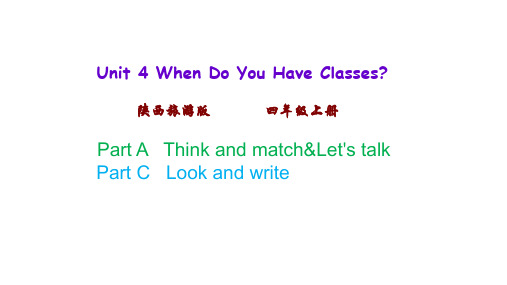
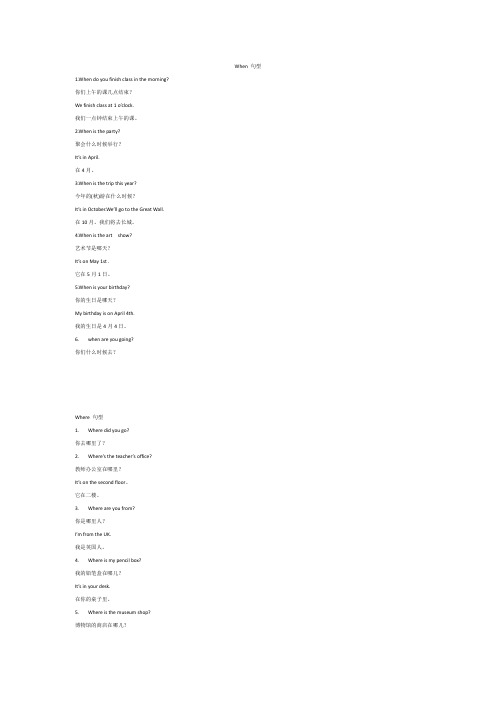
When 句型1.When do you finish class in the morning?你们上午的课几点结束?We finish class at 1 o’clock.我们一点钟结束上午的课。
2.When is the party?聚会什么时候举行?It’s in April.在4月。
3.When is the trip this year?今年的(秋)游在什么时候?It’s in October.We’ll go to the Great Wall.在10月。
我们将去长城。
4.When is the art show?艺术节是哪天?It’s on May 1st .它在5月1日。
5.When is your birthday?你的生日是哪天?My birthday is on April 4th.我的生日是4月4日。
6.when are you going?你们什么时候去?Where 句型1.Where did you go?你去哪里了?2.Where’s the teacher’s office?教师办公室在哪里?It’s on the second floor。
它在二楼。
3.Where are you from?你是哪里人?I’m from the UK.我是英国人。
4.Where is my pencil box?我的铅笔盒在哪儿?It’s in your desk.在你的桌子里。
5.Where is the museum shop?博物馆的商店在哪儿?It’s near the door.在大门附近。
6.Where are you going? 你们打算去哪儿?We’re going to the cinema. 我们打算去电影院。
7.Where does he work? 他在哪儿工作?He works at sea.他在海上工作。
8.Where are the keys? 钥匙在哪里?Who 句型1.Who’s he?他是谁?2.Who’s that man?那位男士是谁呀?He’s my father.他是我的爸爸。

2022-2023学年五年级下册英语期中测试卷时间:60分钟总分:100分听力部分一、听录音,选出你所听到的内容。
(5分)( )1.A.sometimes B.often ually ( )2.A.May B.March C.June( )3.A.summer B.spring C.snow ( )4.A.9:00 B.8:30 C.7:30 ( )5.A.what B.when C.why二、听录音,选出与所听内容相符的图片。
(5分)( )1.A. B. C. ( )2.A. B. C.( )3.A. B. C. ( )4.A. B. C.( )5.A. B. C.三、听录音,根据所听内容,给下列图片排序。
(10分)( ) ( ) ( ) ( ) ( ) 四、听录音,根据所听内容,选出合适的答语。
(10分)( )1.A.I often play sports at 4:30 p.m. B.I often play football at 3:40 p.m.C.I often have an English class at 3:15 p.m.( )2.A.I like fish. B.I like autumn best. C.I often go shopping. ( )3.A.It's in May. B.It's in August. C.It's in March.( )4.A.Because he can pick apples. B.Because he can swim.C.Because he can make a snowman.( )5.A.It's on January 1st. B.It's on April 1st. C.It's on July 1st.五、听录音,根据所听内容,在表格相应位置打“√”。
(10分)MikeJohnAmySarahChen Jie笔试部分六、选出下列每组单词中不同类的一项。
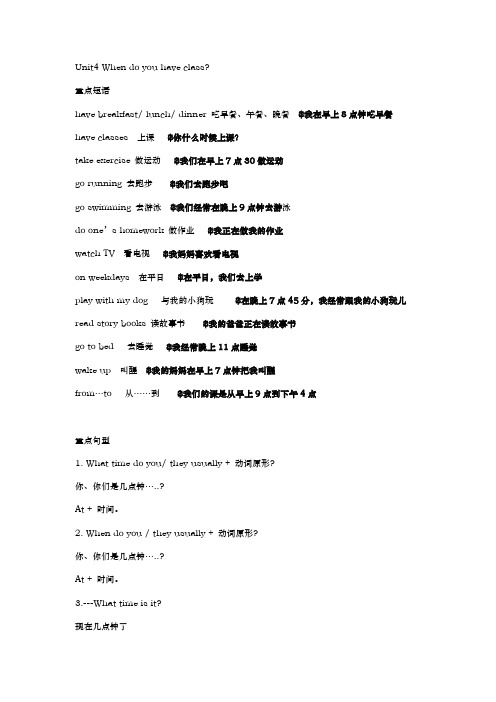
Unit4 When do you have class?重点短语have breakfast/ lunch/ dinner 吃早餐、午餐、晚餐$我在早上8点钟吃早餐have classes 上课$你什么时候上课?take exercise 做运动$我们在早上7点30做运动go running 去跑步$我们去跑步吧go swimming 去游泳$我们经常在晚上9点钟去游泳do one’s homework 做作业$我正在做我的作业watch TV 看电视$我妈妈喜欢看电视on weekdays 在平日$在平日,我们去上学play with my dog 与我的小狗玩$在晚上7点45分,我经常跟我的小狗玩儿read story books 读故事书$我的爸爸正在读故事书go to bed 去睡觉$我经常晚上11点睡觉wake up 叫醒$我的妈妈在早上7点钟把我叫醒from…to 从……到$我们的课是从早上9点到下午4点重点句型1. What time do you/ they usually + 动词原形?你、你们是几点钟…..?At + 时间。
2. When do you / they usually + 动词原形?你、你们是几点钟…..?At + 时间。
3.---What time is it?现在几点钟了--It’s +时间。
句型练习根据中文提示把句子补充完整。
1. time you usually have ? (你通常几点吃早餐)2. I breakfast 7o’clock in the . (我通常早上7点吃早餐)3. do have ? (你什么时候上课呢)4. I have class 8 o’clock in the morning 4:30 in the afternoon.(我们从早上8点到下午4点半有课。
)5. -- you ( take) exercise ? (你进行体育锻炼吗)-- I usually go (run) or (swim) the afternoon from 4:30 to 5:30.我通常在下午4点半到5点半跑步或者游泳四、知识考点【知识考点一】from....to.... 从......到......from....to..... 可指时间、地点、数字的“从...到...”Beijing Shanghai10:00 11:00 in the morning【知识考点二】1 take exercise 进行体育锻炼do exercise = take exerciseHe every day.=He exercise every day.跟take有关的短语take pictures: 拍照take off: 起飞,脱衣服take care of: 照顾【知识考点三】go running: 去跑步It’s time ________ __________ running. 到去跑步的时间了。
Unit9 My favorite subject is science教案学案Section A 1a—2d(听说课)【学习目标】1.掌握本课单词: favorite, subject, P.E, art, science, music, math, Chinese, geography, history, Monday-Friday。
2.重点句型:—— What’s your favorite subject?—— why do you like…?—— who is your …teacher?—— when is your…/ when do you have…3.复习描述性语言:fun, interesting, boring, difficult, easy, relaxing4.学会使用新单词和重点句型相互询问最爱的科目及原因【重点、难点】1.正确使用特殊疑问词: how,what, why, who, when…。
2.询问并回答对方最喜爱的科目及原因。
【导学指导】温故知新:复习运动,食物,颜色,等词。
自主互助学习课前导读一、写出各个科目的英语表达:1.我最喜欢的食物______________2.他最喜欢的颜色_________________3.她最爱的运动_______________4. 有趣的_________________5. 无聊的______________________6. 困难的__________________7. 容易的______________________ 8. 放松的__________________9. 科目________________________ 10. 数学____________________11.地理________________________ 12. 艺术____________________13. 科学_______________________ 14. 历史____________________学习任务:一、学会运用:What’s your favorite…询问个人爱好。
初一英语特殊疑问句单选题30题1.What's your name?My name is Tom.His name is Tom.Her name is Tom.答案:My name is Tom.。
本题考查对“你叫什么名字?”的回答。
“My name is...”表示“我的名字是……”;“His name is...”表示“他的名字是……”;“Her name is...”表示“她的名字是……”。
根据问题“What's your name?”可知是询问“你”的名字,所以答案是“My name is Tom.”。
2.Where is your school?It's near my home.It's far from my home.It's in the park.答案:It's near my home.。
本题考查对“你的学校在哪里?”的回答。
“near my home”表示“在我家附近”;“far from my home”表示“离我家很远”;“in the park”表示“在公园里”。
根据常识,学校一般不在公园里,而问题是询问学校的位置,所以答案是“It's near my home.”。
3.Who is your English teacher?Miss Li.Mr. Wang.Mrs. Zhang.答案:Miss Li.。
本题考查对“你的英语老师是谁?”的回答。
“MissLi”表示“李女士”;“Mr. Wang”表示“王先生”;“Mrs. Zhang”表示“张女士”。
根据问题可知是询问英语老师是谁,答案可以根据实际情况回答,这里假设是“Miss Li”。
4.When do you go to school?At seven o'clock.At eight o'clock.At nine o'clock.答案:At seven o'clock.。
Unit4 《When do you have classes?》教学设计教学目标:1.能听、说、读、写词汇:get up,have a class,have lunch,play games,watch TV,go to bed2.能理解并灵活运用句型:When do you ...?/I...at...教学重点:能听、说、读、写词汇:get up,have a class,have lunch,play games,watch TV,go to bed 教学难点:短语结合句型的灵活运用教学准备:PPT 词汇卡片时间卡片卡通闹钟教学课时:第一课时教学过程:一、Leading In1.Greeting2.Have a guess.二、Presentation1.get up教师用猜谜语引导学生画出闹钟,并借助画好的闹钟说:It’s a beautiful clock.It’s seven in the morning.I want to get up.I get up at seven.(教师做起床动作,学生跟做并重复,抽查个别学生)游戏:大小声2.have a classT:Oh.It’s ten in the morning.We have a class at ten.have a class 师领读,做推浪游戏识记单词师领读have classesI say:have a classYou say:have classes3.have lunch教师拿着卡通闹钟,说:It’s twelve.We shou ld have lunch at twelve.领读have lunch做一做:have lunch ,have lunch,please have lunch4.play games/watch TV/go to bedNext,I will play a magic with our students.Let’s go.(教师拿play games/watch TV/go to bed的卡片,走到一组旁,领读跟读,做变魔术的动作,学生做各种日常动作,选择学生领读词汇,教师与之做对话练习) T:look at the blackboard.Please read the words together.Then,Let’s make some dialogues together.Boys ask the questions,and girls answer the questions.OK?三、Practice Activities1.Then,please move the pictures to the right places.(用大屏幕展示学生做题情况,并邀请学生检查答案)2.T:When do you...?S:I ...at...3.Make some dialogues with your desk mate.4.Who can used the sentences to make some dialogues.I need six groups:S1/S2/S3/S4/S5/S6(say and do)四、SummaryLet’s see.What we have learned today?(教师引导学生结合短语读句子,并将时间贴于后面。
Unit4 When Do You Have Classes ?Period 1目标导读1.能听说读写单词get up have a class have lunch play games watch Tv go to bed.2.能灵活运用上述词汇。
NO.1温故互查1.复习数字1---12(默写)2.Write and drawModel:At nine _________ __________ __________At fiv At eight At tenNo.2 设问导学Good morning,boys and girls.I___ ___ at six in the morning.____ _____ at twelve. At noon.________ at ten in the eveving.What about you?No.3自我检测Look and match1.get A. dinner2.have B.to bed3. play 4.watch D.up5.go E.games看图,给图片选择对应的短语。
A.have lunch B.get up C.have a classD.watch TvE.go to bedF.play games( ) ( ) ( )( ) ( ) ( )No.4巩固练习根据自己的日常生活来填写。
Model: at seven in the morning (起床).______ in the morning- (上课 ).at noon (吃午饭).in the afternoon (做游戏 )in the eveving (看电视 )in the evening ( 上床睡觉)No.5 拓展研究根据No.4给同桌试着用英语描述自己的日常活动。
eg: I get up at seven in the morning.______________________________________________________________ _______________________________指名学生在全班宣读自己的日常活动。